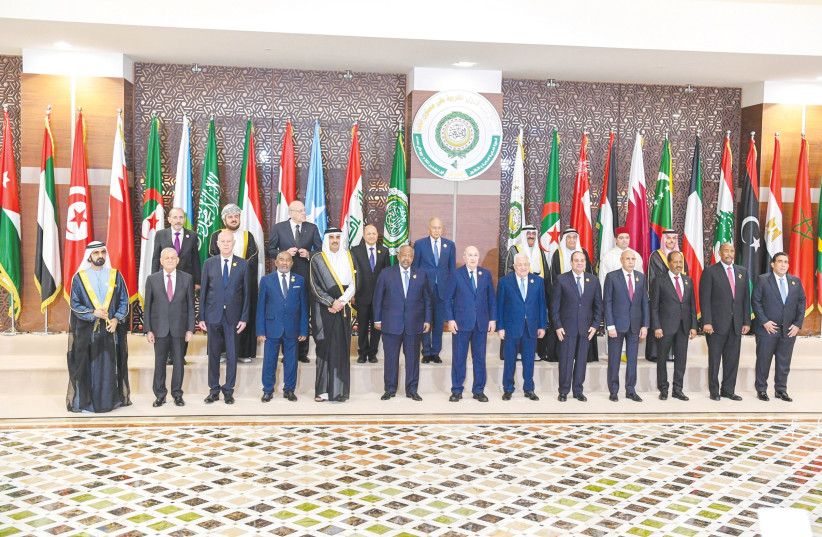Leading Arab nations boycotted the Arab League's consultative meeting on Sunday hosted by the Tripoli-based government in Libya, highlighting the belief on the part of many of the countries that the internationally recognized government lacks legitimacy.
For more stories from The Media Line go to themedialine.org
Of the 22 member states that make up the Arab League, only five sent their foreign ministers as expected, some sent envoys of a lower rank, and countries including Egypt, Saudi Arabia and the United Arab Emirates did not send envoys at all.
Arab League Secretary-General Ahmed Aboul Gheit of Egypt did not attend the meeting, leading Mohamed Hammouda, the spokesman for the Government of National Unity in Libya, to accuse him of being "biased toward one member state over another" during a televised press conference. Hammouda added that the Tripoli-based government is studying the possibility of a response.
Libyan response
Libyan Foreign Minister Najla Mangoush said that the boycott was part of some countries' attempts "to crush Libyans’ desire to transform Arab solidarity into a reality” since, during Sunday’s Arab League meeting, she called on Arab countries to support United Nations efforts to hold the country's stalled elections.
Libya’s civil war, which started after the overthrow of the 42-year-long dictatorship of Moammar Gadhafi in 2011, resulted in the division of the country and the creation of two parallel governments: the internationally recognized Government of National Unity (GNU) based in Tripoli, and the eastern-based House of Representatives (HoR).

Abdul Hamid Dbeibah, who leads the GNU, was appointed to serve as interim prime minister by the UN-backed Libyan Political Dialogue Forum in February 2021, and to oversee the national elections that had been scheduled to take place at the end of that year, but have not yet been held. That is why some countries, such as Egypt, claim that his premiership ended with the deadline for the elections that were supposed to choose a new, unified government. Instead, the country remains divided.
The GNU’s rival government in the east, backed by the Libyan National Army under the command of Khalifa Haftar, has called for Dbeibah to step down and has named Fathi Bashagha as its interim prime minister until national elections are held.
Hiba Hassan, a senior security and political analyst, and a lecturer of diplomacy and international relations at the University of Blanquerna, says that the fact that a handful of powerful Arab foreign ministers boycotted the meeting arguing that the mandate of the Tripoli-based government has ended indicates that the latter faces a serious legitimacy crisis and it also means that the political jostling in Libya will continue.
The Tripoli meeting was supposed to be a regular consultative ministerial meeting ahead of the 158th Council of Foreign Ministers of the Arab League summit scheduled to be held next month in Cairo at the headquarters of the Arab League. Hassan says that this kind of meeting usually is called for by the country that holds the rotating presidency of the Arab League, which currently is Libya.
She notes that some Arab countries did not attend the Tripoli meeting as an attempt to stay distant from the Libyan conflict. But, Hassan told The Media Line, "the absence and attendance of certain Arab countries to the meeting drew a clear map of the Arab allies and opponents of the Tripoli-based government, which will further complicate the Libyan issue, leaving it in a state of stalemate."
Libya's conflict has seen foreign involvement to a great extent, explains Silvia Boltuc, managing director of the SpecialEurasia geopolitical analysis platform.
She told The Media Line that Haftar, the head of the Libyan National Army (LNA) who backs the government in the east, was militarily and politically supported by countries including Saudi Arabia, the United Arab Emirates, Egypt, Jordan, Russia and France; while countries including Qatar, Turkey and Algeria supported the Tripoli-based government.
Boltuc says that the confrontations are particularly harsh between Ankara and Cairo, "whose interests collide not only from a geopolitical point of view but more notably on Libyan energy resources." She adds that it would be inconvenient for Turkey if Egyptian allies in Libya are allowed to control the country’s Mediterranean Sea gas fields and shipping routes.
In terms of the Gulf, she said, Doha "supported a Tripoli government that was more tolerant of Islamist elements, such as the Muslim Brotherhood; the UAE considered Haftar a trusted partner capable of curbing the spread of political Islam."
Dr. Yasmine Hasnaoui, an expert in North African affairs and conflict resolution at the American International University in Kuwait, told The Media Line that this deep division among the Arab League nations regarding Libya will prevent the achieving of tangible resolutions to improve the situation in the North African country.
"I don't think something tangible to the Arab causes nor to Libya`s current political stalemate will come out of this, and this is mainly due to the divisions of the Arab League's states regarding the Libyan crisis or any other related Arab issue," she said.
Boltuc believes that this issue will not dramatically affect the Arab League's activities because, since its inception, it has always dealt with internal divisions and the struggle to obtain more influence between member states.
"It is more likely that this will negatively affect the Libyan crisis, as the country became the chessboard of leading world players’ colliding interests, even though it should be avoided coming to the point – as happened with Syria – to isolate the country and not to find diplomatic channels with the LAS (League of Arab States) institutions," she said.
Hasnaoui noted that Arab nations also are split over issues ranging from the role of Iran in today's world, the legitimacy of Syria's President Bashar Assad, Turkey's interests in some countries, and Algeria's diplomatic feud with Morocco concerning the western Sahara issue.
Both governments in Libya have expressed the intention to hold elections in 2023, but the country still lacks national unity and logistical infrastructure which are key to holding legitimate elections.
